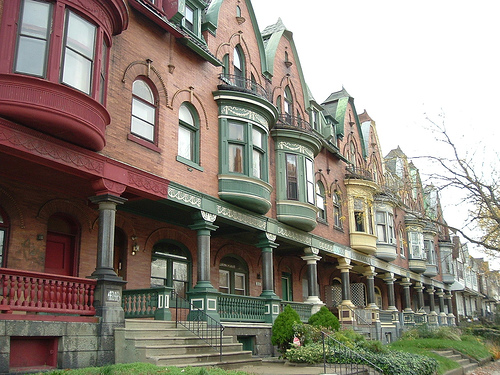 West Philly: “Surprisingly Safe”Feel like getting your blood pumping this morning? Then go check out Philadelphia Magazine‘s recent story entitled: “Is West Philly the Next Center City.” (What? Was “West Philly, the Cure for the Common Neighborhood” taken?)
West Philly: “Surprisingly Safe”Feel like getting your blood pumping this morning? Then go check out Philadelphia Magazine‘s recent story entitled: “Is West Philly the Next Center City.” (What? Was “West Philly, the Cure for the Common Neighborhood” taken?)
There’s obviously a great story to be written about development in West Philly, and the role of Drexel president John Fry in shaping it’s future—this just isn’t it. The writer freely admits he hasn’t spent much time in the neighborhood recently, and radiates surprise that it’s kinda nice. Here’s an actual sentence from the feature:
The short-term goal is to make the northern University City neighborhoods around Drexel more like the clean, leafy, surprisingly safe and prosperous precincts that adjoin the Penn campus, whose very niceness Fry had more than a little to do with creating during a seven-year stint as Penn’s executive vice president under then-president Judith Rodin.
Here are a few other quotes that made me angry:
Eds and Meds is a cute-sounding- nickname for a huge and ominously important economic behemoth. Put broadly and bluntly, if it weren’t for Philadelphia’s universities and hospitals and the often-symbiotic industries lumped under the rubric “life sciences” — biotech, pharmaceuticals, etc. — the only decent jobs with a future in Philly would be with the city government and the school district. (Okay, throw in a few thousand at Comcast.)
Guess the rest of us should just give up.
Many of those new students arriving on Drexel’s side of University City needed to find a place to live. Even the whirlwind, favor-trading Papadakis was only able to grow Drexel’s endowment from an anemic $11 million in 1995 to as much as $590 million. (By contrast, Penn is sitting on $5.7 billion.) There simply wasn’t enough money to build dormitories fast enough. The new students overran Powelton Village and made a beachhead farther out in Mantua, taking fragile neighborhoods and pushing them to the precipice of being ghettos — albeit student ghettos.
Um, yeah.
Then there are the horrors of student life:
As he walked me around the neighborhood that morning, sipping from a mug of his home-brewed coffee, Poulin talked about the promise of Powelton, its beautiful tree-lined streets, the “good bones” of the housing stock, its easy proximity to Center City and the recent growth of amenities nearby. Then we walked onto some streets that Poulin said were completely owned by absentee landlords, and things got ugly pretty quickly.
Trash spilled onto the crumbling sidewalks, which were littered with that ubiquitous symbol of collegiate nightlife, the big red plastic Solo cup. A row of what had once been cute red-brick Victorian twins was slipping into disrepair, yet seemed full of student occupants, the worn-out couches and chairs of one generation serving as the porch furniture of the next.








why be so negative??
I just finished reading the philly mag article and thought it was a positive story about drexel's new president. He is forward thinking and wants to embrace the community in which drexel sits. Rather than push out the neighbors, he wants to make it better for them.
iI have always thought grid was a positive rag, now, I am left wondering what you guys are thinking.
Philadelphians are either those who say, "no," or those who say, "yes," &, "lets make it better."
Mr. Frye is one who says yes. And I am so glad for him. The comment from grid happens to cast a big, sorry negative, on an otherwise terrific thing that is happening in our city.
As I said in the post, I think there is a great story to be written about Fry's work in West Philly. He seems like a motivated, savvy leader. That said, this story struck a truly discordant note—at least in my eyes.
As I said in the post, I think there is a great story to be written about Fry's work in West Philly. He seems like a motivated, savvy leader. That said, this story struck a truly discordant note—at least in my eyes.